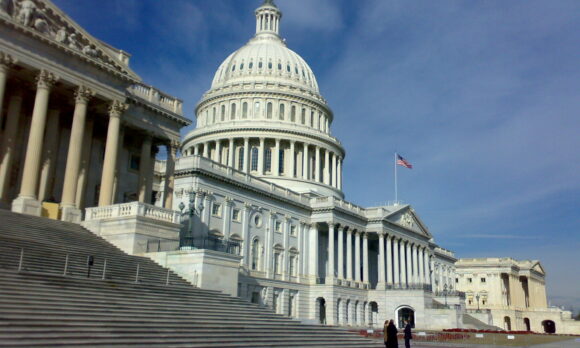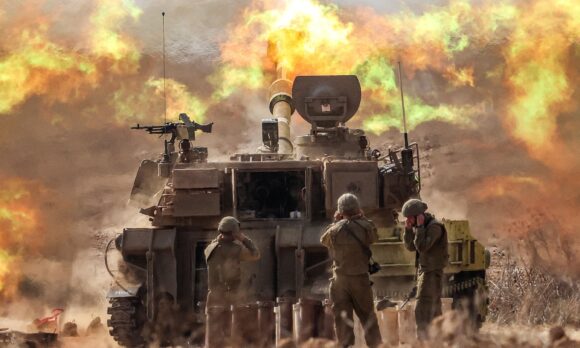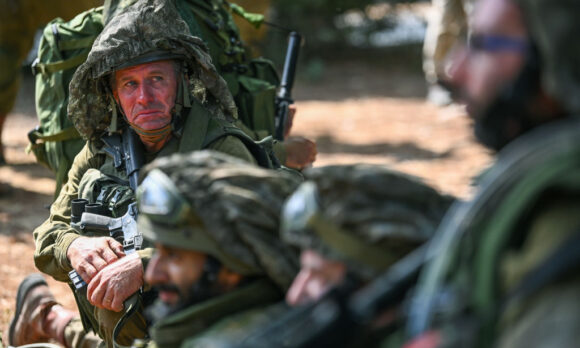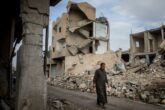January 31, 2024
Sharper: Middle East Security and Stability
Analysis from CNAS experts on the most critical challenges for U.S. foreign policy.
The fallout from the war in Gaza created a considerable shift in Middle East regional dynamics and challenges to cohesion. As the region continues to experience broadening security and humanitarian issues, policymakers are growing increasingly concerned over its safety and security and the potential for progression toward a greater regional conflict. CNAS experts are sharpening the conversation around U.S. Middle East security policy. Continue reading this edition of Sharper to explore their analysis, commentary, and recommendations.
Features
How America and the Middle East Continue to Look Past Each Other
“The American-led invasion of Iraq, which took place 20 years ago this week, set in motion a series of commitments to the Middle East, which have shaped the limits and tempered the expectations of American policy in the region and beyond,” argues Jonathan Lord in The Economist. “The 2003 invasion, a tactical success, gave way to a second act that laid bare how unprepared the United States was to win the peace. It managed the problem, which grew increasingly intractable, through a series of uninformed (or misinformed) decisions, the way it always has: by throwing resources at the problem. Burdened by this history, and facing the need to reshape foreign policy in the light of challenges posed by China’s increased engagement in the region and the raw aggression of Russia, the Biden administration has a new vision for policy in the Middle East. However, it contains glaring omissions and fails to address key obstacles to its possible success.”
Crisis in the Middle East with Jon Alterman
Since the outbreak of war between Israel and Hamas this past fall, many have feared the possibility that the fighting could metastasize into a broader regional conflict. Such fears have only grown in recent weeks, as violence has risen across the Middle East. With increasing regional turbulence, the United States and Europe will face mounting pressure to take actions geared towards restabilization, complicating their ability to devote resources to other ongoing challenges such as the war in Ukraine. To unpack recent and their likely implications for the transatlantic partners, Jon Alterman joins Andrea Kendall-Taylor and Jim Townsend on this episode of Brussels Sprouts.
U.S. Defense Bill Shows Bipartisan Israel Support
“Because the NDAA’s contents are exhaustively debated by members and staff to ensure the bill achieves broad bipartisan, bicameral majorities, you can study its many provisions for insights into what politically, 'the market will bear' among a majority of both Congressional Republicans and Democrats,” writes Jonathan Lord for The Times of Israel. “Reviewing the totality of the Middle East-related provisions in the Fiscal Year 2024 NDAA, one thing becomes abundantly clear: irrespective of the shrill and seemingly prevalent public sentiment that Israel is increasingly isolated, the Jewish State continues to enjoy broad bipartisan support in the US Congress.”
Jonathan Lord on How America and the Middle East Continue to Look Past Each Other
The American-led invasion of Iraq, which took place 20 years ago this week, set in motion a series of commitments to the Middle East, which have shaped the limits and tempered...
Crisis in the Middle East with Jon Alterman
Since the outbreak of war between Israel and Hamas this past fall, many have feared the possibility that the fighting could metastasize into a broader regional conflict. Such ...
US Defense Bill Shows Bipartisan Israel Support
For the 63rd consecutive year, Congress has passed the National Defense Authorization Act (NDAA) and sent it to the President’s desk for his signature. The Congressional commi...
Events
Congress and the Conflict in Gaza: A Conversation with Congressman Adam Smith
On October 20, CNAS hosted a virtual event with Congressman Adam Smith (D-WA 9th District), Ranking Member of the House Armed Services Committee, and hosted by Jonathan Lord, Senior Fellow and Director of the Middle East Security Program at CNAS. Lord and Ranking Member Smith discussed the current conflict in Gaza, stemming from Hamas’s October 7th terrorist attack on Israel; Washington’s response to and role in the conflict; Saudi-Israel normalization prospects; and Middle East regional security integration.
20 Years Later: The Legacy of Operation Iraqi Freedom
March 20, 2023 marked the 20th anniversary of Operation Iraqi Freedom (OIF). OIF was launched by U.S. forces to end Saddam Hussein’s authoritarian regime. The 2003 invasion of Iraq transformed Iraq and reverberated throughout the Middle East in ways that are still felt today. The U.S. military continues to confront and contend with the lasting impact of the war on the force and veterans, while military necessity birthed rapid technological advancements which have indelibly altered the way of war. As we reflect on the past two decades, what is the current-day legacy of OIF? How did emerging technologies impact the war? And how did OIF influence the U.S. military’s veteran’s culture? On March 27, 2023, CNAS hosted a series of expert panel discussions to examine the lasting echoes and impacts of OIF here and in Iraq.
After the Defend Act: The Future of the Abraham Accords
CNAS Middle East Security Senior Fellow and Program Director Jonathan Lord moderated a discussion with Sen. Joni Ernst and Rep. Brad Schneider to discuss their views on Congress’ vision and role in the future of U.S. security engagement in the Middle East. The conversation continued with a fireside chat with Barak Ravid to discuss Middle East regional dynamics, opportunities, and challenges.
Virtual Fireside | Congress and the Conflict in Gaza: A Conversation with Congressman Adam Smith
Oct 20, 2023
Virtual Event | 20 Years Later: The Legacy of Operation Iraqi Freedom
Mar 27, 2023
After the Defend Act: The Future of the Abraham Accords
CNAS Middle East Security Senior Fellow and Program Director Jonathan Lord will moderate a discussion with members of Congress to discuss their views on Congress’ vision and r...
Commentaries
Twenty Years Later, the U.S. Military Is Still Lost in Iraq
“The United States is prepared to provide more of the same, until it isn’t,” writes Jonathan Lord for Lawfare. “When political winds in Washington and Baghdad once again align to make the presence of U.S. troops in Iraq untenable, as they did when Austin last served in Iraq, what kind of force will they leave behind? Having done little to enable the Iraqi security forces to sustain their own capabilities, the Biden administration is setting the conditions for another strategic failure in Iraq. Instead, the administration should lay forth a strategy that leaves the Iraqi forces capable of fighting for themselves without dependence on U.S. forces. After 20 years, it’s time the U.S. learned its lesson.”
Israel’s Military Tech Fetish Is a Failed Strategy
“It may be exactly this IDF quest for high-tech superiority over low-tech adversaries, such as Hamas, that has clouded its vision,” argues Franz-Stefan Gady for Foreign Policy. “Not only did the IDF’s sense of technological superiority contribute to its failure to anticipate a sophisticated combined arms attack on Oct. 7, but it may also be a tactical disadvantage in the expected ground campaign in Gaza. This wouldn’t be the first time it has been a problem: Analysts have pointed out that a “cult of technology” contributed to the IDF’s poor performance in the 2006 Lebanon War.”
Washington’s Security Strategy in Iraq was Deep-Frozen. This Week Might Bring an Overdue Thaw.
“The Iraqis too have hard choices to make,” notes Jonathan Lord for Breaking Defense. “It will require immense political will and courage to reform an Iraqi defense establishment that continues to perpetually hollow itself through corruption, indifference, and over-dependence on foreign assistance. It will require Prime Minister Sudani to ultimately confront and rein in para-military forces that exert too much political power, answer to too many commanders that aren’t him, and extract too many resources from Iraq’s government, for too-little security benefit for Iraqis. It will require Iraqi Kurdish leaders to commit to meaningful reform of the Peshmerga, such that it’s no longer the arm of political factions, but rather a tool of state security that’s answerable to elected leaders. It must operate to secure the safety and future of all Iraqi Kurds, in coordination with federal Iraq as a partner, and not be abused by individual Kurdish leaders for their own power and enrichment.”
Twenty Years Later, the U.S. Military Is Still Lost in Iraq
Having done little to enable the Iraqi security forces to sustain their own capabilities, the Biden administration is setting the conditions for another strategic failure in I...
Israel’s Military Tech Fetish Is a Failed Strategy
Israeli Prime Minister Benjamin Netanyahu’s strategic myopia and hubris that led him to be blindsided on Oct. 7 was enabled by the trust that the IDF and Israel’s other securi...
Washington’s Security Strategy in Iraq Was Deep-frozen. This Week Might Bring an Overdue Thaw.
It will require immense political will and courage to reform an Iraqi defense establishment that continues to perpetually hollow itself through corruption, indifference, and o...
In the News
Featuring commentary and analysis from Richard Fontaine, Jonathan Lord, Arona Baigal, Alex Zerden, and Rachel Ziemba.
Deadly Attack on U.S. Troops Highlights an Open-Ended Military Mission
The slow pace of change in America’s military operation in Iraq is due to, in part, “a degree of malaise as well as a cultural and political risk aversion that is comfortable ...
Richard Fontaine Joins CNN News Central to Discuss the Israel and Hamas War
On November 1, CNAS CEO Richard Fontaine joined CNN Central to discuss the latest developments in the Israel vs Hamas war, the opening of the Egyptian border to foreign nation...
Is Cryptocurrency Enabling Hamas? Efforts to Halt Terror Funding Revive.
“It’s a space of finite resources and constantly changing prioritization,” says Alex Zerden, a terror-financing expert formerly at the U.S. Treasury and now head of his own ri...
How the world economy could react to escalation in the Middle East
The conflict between Israel and Hamas has been going on for more than three months, and is now beginning to spill into other parts of the Middle East. That includes attacks on...
Why U.S.-Iran Tensions Are On The Rise In The Persian Gulf
Over the last decade, Iran has been causing more and more headaches for oil tanker operators in the Strait of Hormuz, a central artery of global trade. In the last two years a...
U.S. and Iraqi Governments Expected to Start Talks on Future of U.S. Military Presence in the Country
Jonathan Lord, the director of the Middle East security program at the Center for New American Security, told CNN that the US needs to transition its support for Iraq toward b...
About the Sharper Series
The CNAS Sharper series features curated analysis and commentary from CNAS experts on the most critical challenges in U.S. foreign policy. From the future of America's relationship with China to the state of U.S. sanctions policy and more, each collection draws on the reports, interviews, and other commentaries produced by experts across the Center to explore how America can strengthen its competitive edge.
Subscribe
Sign up to receive the latest analysis from the CNAS expert community on the most important issues facing America's national security.
More from CNAS
-
Our Man in Damascus? Sanctions and Governance in Post-Assad Syria
The complexity of the legal and policy issues presented by the sanctions thicket surrounding Syria—and the disparate authorities responsible for various parts of it—will requi...
By Alex Zerden
-
Cryptocurrency in the War Zone: A Closer Look at Recent Events in Syria
Syria’s political fate remains in flux, both internally and in terms of its relations with key regional powers....
By Eitan Danon
-
Syria: What Happened and What Comes Next
After more than a decade of civil war involving major interventions from foreign powers, over the past week a rebel alliance incredibly rapidly gained control of city after ci...
By Richard Fontaine
-
Washington Needs a New Syria Policy Right Now
It is well past time for Washington to demonstrate leadership, advance its global and regional interests, and support the freedom and future of the Syrian people....
By Jonathan Lord


















